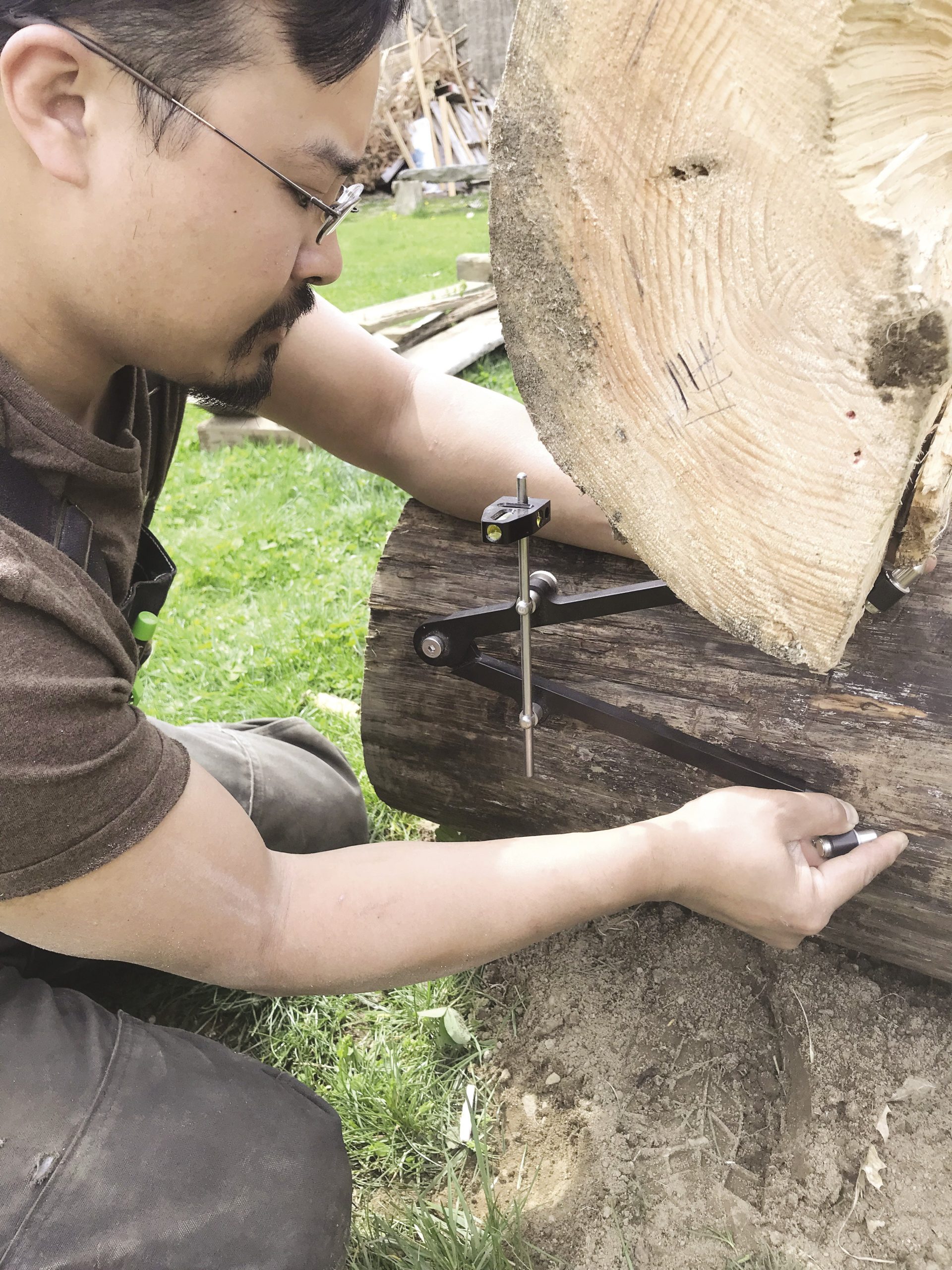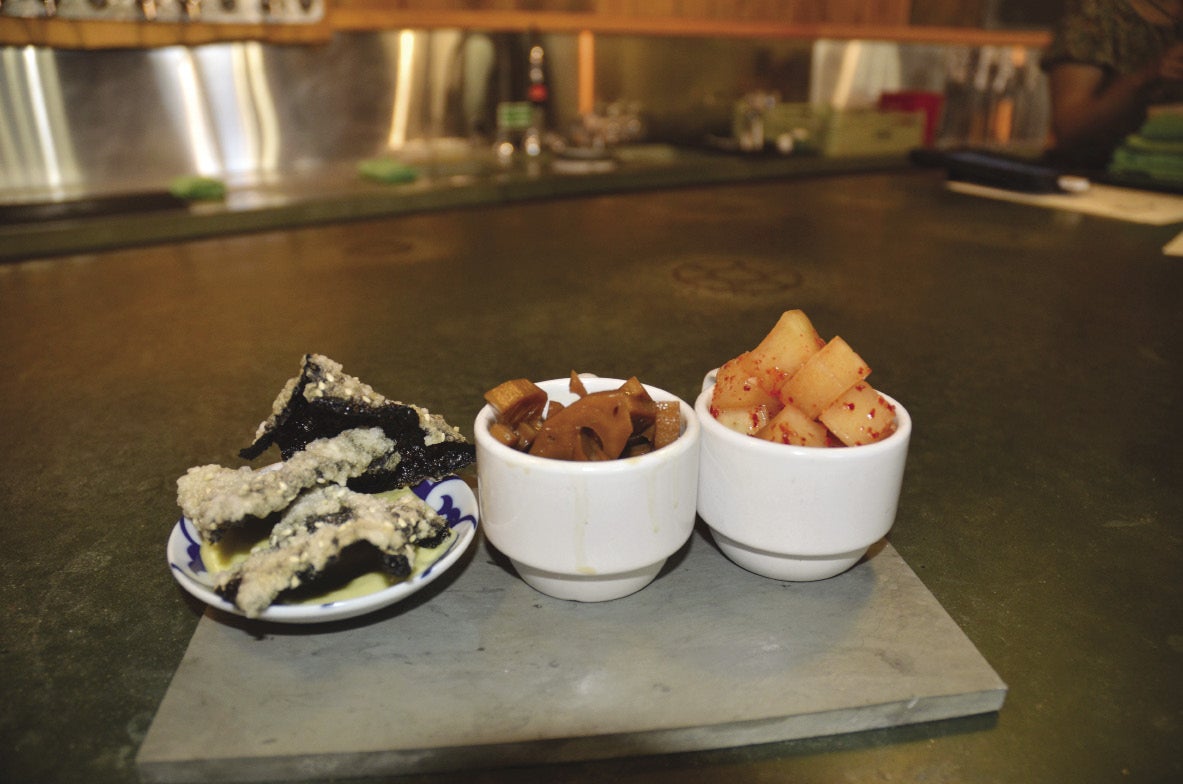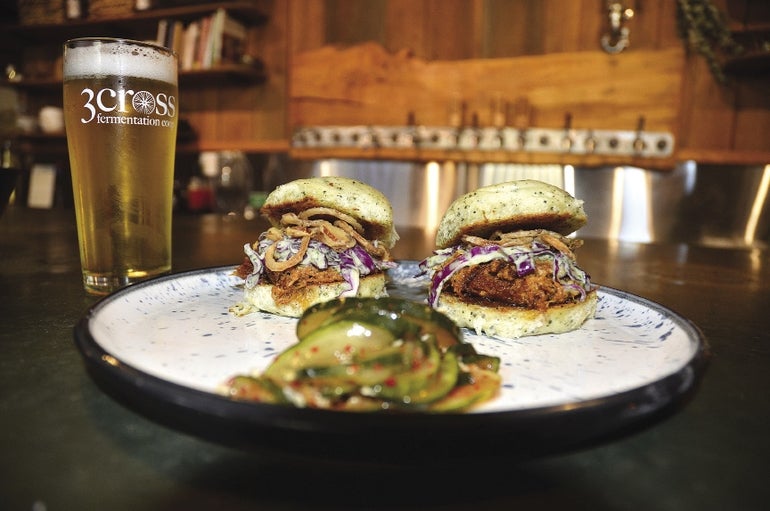Wooden Bar is housed in the location of 3cross Fermentation Cooperative, which closed during the early waves of the ongoing coronavirus pandemic.
Get Instant Access to This Article
Subscribe to Worcester Business Journal and get immediate access to all of our subscriber-only content and much more.
- Critical Central Massachusetts business news updated daily.
- Immediate access to all subscriber-only content on our website.
- Bi-weekly print or digital editions of our award-winning publication.
- Special bonus issues like the WBJ Book of Lists.
- Exclusive ticket prize draws for our in-person events.
Click here to purchase a paywall bypass link for this article.
The beat-up parking lot has an absence of demarcations. The power lines nearby provide an air of disquiet. The only indication there’s a restaurant inside the nondescript building on Knowlton Street in Worcester is a little, rectangular blue sign reminiscent of local dive bars across the country with the words “Wooden Bar” on it. Even that feels misleading because it’s under a similar yellow sign for “PLAYOFF” games, a relic of a long-gone generation when arcades were a social spot.
But, inside there’s a dark basement restaurant where Christopher Ly and Spencer Mewherter have turned their handmade noodle pop-up into a little restaurant refusing to follow the traditional rules. “Things happen organically, for better or for worse, in this space,” Mewherter said.

Wooden Bar is housed in the location of 3cross Fermentation Cooperative, which closed during the early waves of the ongoing coronavirus pandemic. Ly and Mewherter took over the lease in 2021 and began to transform the brewery into a restaurant, allowing them not only the chance to bring their pop-up Wooden Noodles to life, but gave them the opportunity to search for what’s next.
There’s endless opportunities for projects like brewing sake and beer – they have a brewery license – as well as miso and soy sauce. There’s a printing press housed in the space for their own merchandise (don’t ask, it’s not ready yet) and menus. This Knowlton Street getaway is a place for Mewherter and Ly to explore their ambitions while focusing on keeping costs low on overhead, food, supplies, waste, and staffing. They’ve been able to do all of that because of how they watch their bottom line and because the tradesmen community they come from is based around working together.

“Our version of business-commerce is we offer what we have,” Ly said. “We're more bartering with a lot of things we come into. It's not just strictly money and contracts.”
Relying on a community
The connections Ly formed started when he arrived in Worcester, after flunking out of college and following a girl to the city. He felt lost after high school and going to college then was just what you did, even though that path didn’t suit him. He worked in restaurants as a teenager but didn’t know what he wanted to do or who he wanted to be. In Worcester, he found a community of craftsmen. It gave him a purpose.
“I reevaluated a lot of things in my life and tried to put in order my values and how I was going to create a living with those values. So I kind of floated around,” Ly said. “I kind of got lucky: I got into a group of tradesmen right away and found a carpentry shop, a blacksmith shop, things that made sense to me. Things didn't make sense to me [then], but hammering something made sense to me. It was very tactile.”
When the BirchTree Bread Co. began its plans to open in Worcester, Ly got a job tiling, and then co-owner Robert Fecteau took a liking to him. Fermentation, like construction, made sense to Ly. He said yes and his journey into the deep reaches of restaurant life began in earnest.
Through the trade community, Ly met Mewherter, who had moved to the city from the North Shore to attend Clark University. Mewherter arrived in Worcester with experience working in trades and joined the local group of small shop owners who did the various construction jobs needed. The pair shared a love of food and started throwing pop-ups while honing a business plan for their little venture. They did one at the former Worcester restaurant simjang and then did the brewery circuit.
Ly wanted to learn more about cooking and specifically ramen, so he took a job at Little Big Diner in Newton. Next came North, the Providence restaurant that set-off part of that city’s restaurant scene. Working there was shot in the dark for Ly, but one that paid off.

Then COVID arrived, and everyone needed to refocus. Mewherter and Ly were able to use the time to formulate a plan for the future of their project. An opportunity they couldn’t pass up landed at a familiar location: 3Cross.
They kept the same layout for the bar and repurposed the brewing area into a makeshift kitchen and fermentary. They continued leasing space to the nonprofit Worcester Earn-A-Bike. The facility upgrades they did make were done by them and their friends who pitched in. No contractor. No extra hands they didn’t know. No extra costs. There’s the friend who rebuilt the ice machine they were gifted.
Then there’s the North connection. A lot of the kitchen equipment came from North, gifted to Ly from owner James Mark, who has been nominated for the prestigious James Beard Foundation Award for restaurants.
“They're doing exactly what I want the cooks that worked for me to do,” Mark said. “Pursue projects that make them happy and make them feel creatively satisfied, and hopefully it works out for them financially as well.”
Wooden Bar opened in May. Quiet. A trickle of word-of-mouth. No press releases and no big grand party.
The new restaurant was open one night a week: Thursdays, because Ly worked the other nights at either Little Big Diner or North. Then they added Fridays after North closed permanently, and he left Little Big Diner. They’ve kept those hours because it’s allowed them to harness all their efforts during the week to make the best food they can while keeping costs down by closing during what would have been typically slower times in a restaurant.
Minimizing waste
It’s a model lots of restaurants are exploring as they come out of the ongoing COVID slumber.
“It’s the evolution of the pandemic,” said Steve Clark, president and CEO of the Massachusetts Restaurant Association. “Operators noticed that they don’t need to be open all the time, but open only when they need to be open.”
Since COVID shut the world down in March 2020, restaurants, and the rest of the service industry, which did most of its business by pleasing people in-person, had some of the hardest times adapting. The old rules of how to open and operate a restaurant disintegrated. They had to learn how to staff for take-out only; how to become retail shops for beer and wine; how to package meals and work with a choked supply-chain; adapt to a shortage of workers and talent. With all of that in play, the industry has begun to discover new models of what a restaurant is.
What has led to some of these changes is the technology and data now in the hands of restaurants. With tools like Toast, Clover, and Squarespace, restaurants can now understand the costs of staying open during down times. They can see from modern point-of-sale software the underlying trends and identify more readily when the kitchen is in the weeds and when only a trickle of people stumble in. Now, more than ever, restaurants have hard data.
“Tech is part of it and analyzing when to be open,” Clark said.
On top of that, part of the dining crowd disappeared since COVID.
“Segments of the day have not come back,” Clark said. “Lunch has not come back, and the second time of the day that hasn't come back is after 9 p.m., late night.”
Restaurants were open for lunches because people worked in offices and went out for lunch. Now, with more people working from home, the working lunch is gone. Driving around the state, Clark has noticed suburban restaurants closing earlier because nothing happens anymore after the dinner rush. So, as a restaurant owner, why pay for electricity and staff to open when there’s little guarantee you will cover those costs, never mind make a little profit?
There’s something beautiful about the synergy of Wooden Bar. When the space was being revamped from an unused basement into 3Cross, Mewherter and Ly both had a hand in the renovations. Ly scraped the ceilings, and Mewherter sanded and polyurethaned the woodwork around the bar. While the world continues to change, so do restaurants. Life evolves and goes where it wants and needs to, which is something Mewherter understands innately. It’s what has attracted him to both woodworking and cooking.
“With carpentry and woodworking, at a certain point if wood is going to move in a certain direction then wood is going to move in a direction. You can't control that process. You have to work around it and adapt to it,” Mewherter said. “It’s similar to a lot of fermentation, you are beholden to a lot of natural processes outside of your control. It's about your response to it.”
On a Thursday night, soon after 5 p.m. a group of regulars arrived. They slowly showed up, each walking up to the bar to order their own food. Kids in tow. They sat at a long table and chatted about their week at work, life, the world never letting up. Noodles on the table. Pulled pork sliders in steamed milk buns arrived. They found a little pocket of happiness and community in a basement. Something new and different. It’s eerily reminiscent of the chicken shack where Andy Ricker started his Pok Pok Empire in Portland, Oregon, and helped create the food boom there: something simple, beautiful, and pure started by someone looking to open the world to the thing they wanted to create, but on their own terms. There’s no master plan. Organic.
Maybe even one day, Wooden Noodles will open on Saturdays.
“We're not opposed to being open on Saturdays” Ly said. “As soon as we can and have the right people in place, we will.”

